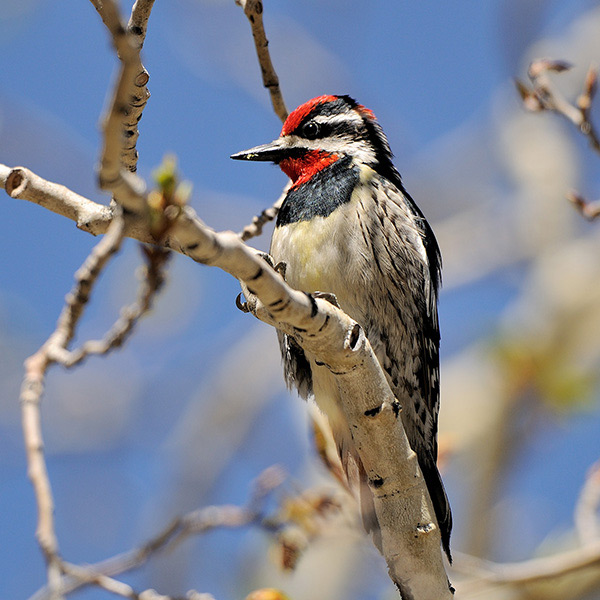|
Utah Bird Profile |
|||||
|
Name Roots: (Gr. sphyra, "a hammer"; L. picus, "a woodpecker" - nucha, "nape, scruf of the neck") |
|||||
| In Utah: |
 by John Crawley |
||||
| Nesting, feeding, behaviors: |
This woodpecker is listed as common summer and rare winter on the state
checklist. Quoting Sibley, “Nests in mixed coniferous woodlands. Winters in
any woodlands. Drills rows of small shallow holes in tree bark, feeding on
sap and on insects attracted to sap.” Sapsucker tongues are somewhat shorter
than the other woodpecker’s tongues. They have fine, hairlike process on
their tips for obtaining sap by capillary action. ~ Merrill Webb Nests in a deciduous tree at a height of 10-20 (3-35) feet, in a cavity nest. This species is not a cowbird host. During the breeding season, this species is an omnivore: bark excavator. During the non-breeding seasons this species is an insectivore: bark gleaner; omnivore: bark excavator. |
||||
| Habitat: | Summer: mixed coniferous woodlands Winter: and woodlands Breeds in Utah in aspen and mixed conifer habitats. |
||||
| How to find: |
In my experience I have found this species in Utah County most
consistently on the Alpine and Nebo Loops where there is a mix of
aspen-conifer. While conducting breeding bird surveys during nesting season
I have found them in Soapstone Basin, Diamond Fork Canyon, Strawberry
Valley, and Sheep Creek Canyon along small streams where there are abundant
willows adjacent to thick stands of aspen. During winter bird surveys in
Washington County I have observed them in orchards at Lytle Ranch,
Rockville, and Grafton.
~ Merrill Webb |
||||
|
|
USGS Profile
(Geological Survey) |
US Winter Range |
US
Summer Range Map | |
|||||
|
|||||
|
Abbreviations | References | Legend
|
|||||